Apples
A survey that questioned 115 consumers found Pink Lady was the favoured snack, beating crisps, chocolate and celery
Branded apple Pink Lady has beaten off competition from celery, carrots and milk chocolate to become the nation’s top snack, according to a new consumer survey.
Conducted by Pink Lady brand manager Coregeo, the survey asked 115 consumers to rate snacks for taste, satisfaction, emotion and sensory attributes by either choosing a number on a nine-point scale, or selecting from a list of words that best described their reaction. This was dubbed the ‘Scale of Snackisfaction’ and analysed for qualitative consumer feedback on the different snacking options.
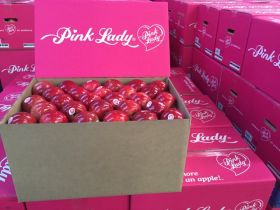
Pink Lady was rated top among consumers, followed by carrots and celery. Other snacks tested were milk chocolate, a shortbread finger, unsalted mixed nuts and crinkle cut ready salted crisps.
The survey forms part of the wider ‘Snackisfaction’ campaign, run by marketing agency MCG on behalf of Coregeo, which aims to position Pink Lady as the snack of choice. It was launched in April following a study from Leatherhead Food Research that demonstrated how subjective emotions such as guilt or excitement can influence the satisfaction rating of a sensory experience.
Other activity has included a ‘Tweet to eat’ roadshow and experiential marketing concept, where consumers could tweet the hashtag #snackisfaction to receive a Pink Lady by post.
During the campaign, 80,000 Pink Lady apples were distributed, coverage generated over 345,500 engagement opportunities on social media and Twitter activity rose by 11 per cent, Coregeo said.
Along with continuous investment in quality control and standards, this targeted consumer marketing has led to Pink Lady seeing a nine per cent year to date growth.
Michelle Toft, Coregeo chief marketing officer, said: “It’s no surprise to us that the Snackisfaction campaign was a huge hit with consumers because Pink Lady is fast becoming the fresh-fruit snacking favourite for the growing number of consumers who recognise its uniquely satisfying combination of taste, texture and refreshing nutritional qualities.
“In fact Pink Lady excelled in terms of tastiness and appearance and overall was more snackisfying than other types of snacks, showing that it’s a serious contender as a satisfying snack.”
Future success will depend on continued commitment to quality and innovation, say consortium directors
Italian apple group, Vog has marked the 70th anniversary of its foundation with a special press meeting and the launch of a new corporate logo.
Formed in Terlano, South Tyrol, amid the rubble of Europe just after the end of the Second World War, Vog has grown to become Europe’s largest single producer of apples and a major player on the international topfruit market, supplying markets in a large number of countries, both in Europe and beyond.
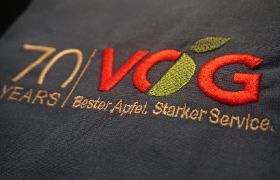
Vog president Georg Kössler described the anniversary as “a major milestone”. He also suggested that the group’s future success was assured provided it concentrated on product quality, joint marketing efforts and innovation across the board.
“Varietal innovation is the road we have to follow if we are to secure a good future for apple growing in South Tyrol,” he added.
His colleague Gerhard Dichgans, the consortium’s managing director, said the creation of a co-operative marketing system had played a major role in the development of agriculture in the South Tyrol region.
“In the future, I expect to see a continued change in the kind of apples being produced, with new varieties arriving and being sold through the new commercial structure we introduced a few years ago,” he commented.
“In terms of markets, Germany and Italy are no longer growing in terms of volume, so we have to chase new opportunities in other markets.”
The new logo features high-impact graphics and a simplified apple icon, which Vog’s PR manager Sabine Oberhollenzer said added a sense of modernity to the consortium’s traditional image while retaining the colour scheme and stylistic identity of the past.
Eating an apple before going shopping causes a person to buy 25% more fruit and vegetables, a study found.
US researchers discovered people can be primed to buy healthy food if they eat a wholesome snack before going to the supermarket.
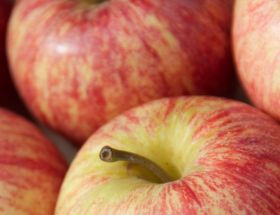
The team, at Cornell University, recommend eating a piece of fruit before hitting the aisles, and argue that supermarkets should offer samples to shoppers to encourage them to make healthy choices.
The researchers carried out three studies to find out if healthy snacks cause shoppers to make better food choices in the shop.
In the first study, 120 shoppers were randomly given either a bit of apple, a piece of cookie or nothing at all when they arrived at the supermarket.
The researchers tracked their purchases and found those who were given the apple bought 28% more fruits and vegetables than those given the cookie.
And they bought 25 per cent more fruits and vegetables than those given no snack at all at the start of their shopping.
Dr Aner Tal, of Cornell University, who carried out the research with his colleague Dr Brian Wansink, said: “What this teaches us is that having a small healthy snack before shopping can put us in a healthier mindset and steer us towards making better food choices.”
Italian apple association Assomela and the French inter-professional organisation Interfel have been awarded more than €2.8m in funding by the European Commission to support a three-year campaign aimed at boosting consumption of apples in non-EU markets.
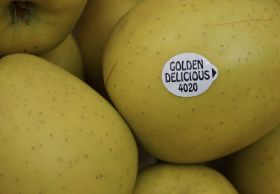
The campaign, which has a combined budget of €5.6m including funds provided by Assomela, Interfel and their own governments, will continue the work carried out by the two organisations as part of a three-year project called European Fresh Attitude, which focused on apples and kiwifruit in so-called third countries.
The results of that project have been described as “extremely positive” by representatives of Assomela, which counts major apple suppliers Vog, VI.P, Melinda and La Trentina among its members.
The aim of the new project is to raise awareness and encourage exports of Italian and French apples to markets in Africa, China, the Middle East, Norway, Russia, South-East Asia and South Korea.
As well as enabling the groups to promote the campaign at key trade events likes World Food Moscow and Asia Fruit Logistica in Hong Kong, the funds will also be used to pay for PR activities at point of sale and at major sporting events in Morocco, Israel and Norway.
Giulia Montanaro, head of international relations at Assomela, welcomed the EC’s decision to renew its financial support for the campaign.
“Consolidating and increasing exports of Italian apples outside the EU is fundamental at a time like this and the project that’s been approved can be a useful tool for our member producer organisations in reaching that objective,” she said.
Montanaro added that the new project’s approval had been made more likely thanks to the good collaboration between Italian and French counterparts over the past few years, a kind of cross-border teamwork that could make it easier to enter new markets in future.
Arctic comes in from the cold after US prepares to grant OSF licence to grow non-browning Golden Delicious and Granny Smith
The world’s first genetically modified apples will be grown commercially in the US for the first time following a decision by the US Department of Agriculture to approve two non-browning versions of Golden Delicious and Granny Smith for large-scale planting.
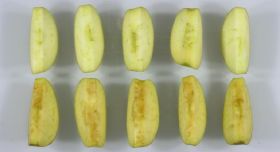
The varieties, which were developed using biotechnology by Canadian group Okanagan Specialty Fruits (OSF), will be marketed under the Arctic brand are likely to be on the market in 2016, according to the company’s president Neal Carter.
It is expected that the USDA’s Animal and Plant Health Inspection Service will publish its final environmental assessment and plant pest risk assessment shortly.
“This milestone is nearly two decades in the making, as Arctic Golden and Arctic Granny apples represent OSF’s first products since our inception in 1996,” Carter commented.
“We’re very excited for everyone who touches apples to experience the benefits of non-browning apples, and encourage you to read about the significant value they offer to growers, packers, fresh-cut and traditional processors, foodservice, retailers, and most of all, consumers.”
He added that the supply chain should feel confident that Arctic apples, which OSF says are identical to their conventional equivalents besides the fact they do not brown when cut, were probably “the most tested apples in existence”.
“All evaluations reach the same conclusion,” he said, “Arctic apples present no unique risks and are just as safe and healthful as any other apple.”
But it’s also true that the Arctic series has faced stiff opposition, not least from the Organic Consumers Association (OCA), which argued against granting approval on the grounds that genetic changes to prevent browning could adversely affect human health, while suggesting that pesticide residue levels on the apples might also be higher than otherwise necessary.
“This whole thing is just another big experiment on humans for no good reason,” said OCA director Ronnie Cummins.
Five years ago, OSF applied for non-regulated status for the two varieties and, since then, has been working to find potential commercial partners, including processors and growers, to bring the Arctic apples to market once regulatory approval was granted.
In 2012, the USDA’s Animal and Plant Health Inspection Service opened a 60-day review period for members of the public to offer comment on two non-browning apple varieties, Arctic Golden and Arctic Granny.
Later that year, Carter used a speech at a TEDx event in Canada to deliver an impassioned defence of agricultural biotechnology.
Pipfruit New Zealand has predicted an apple and pear season characteristic by high quality
The forecast of a lighter and later crop has failed to diminish the hopes of the New Zealand pipfruit industry heading into the 2015 season.
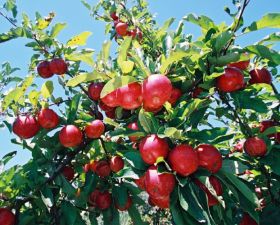
A report released by peak body Pipfruit New Zealand indicated the country’s total apple and pear production would be around 551,102 tonnes this year, down 6% on 2014.
Hail storms that swept across the country during late Spring took their toll on crops in key growing regions such as Hawkes Bay, Nelson and Central Otago, however, a warm start to summer seems to have been a saviour for the industry, with fruit quality now shaping up well.
“Every growing region has had an exceptionally warm mid-summer, which has meant apples have developed a well-rounded sweetness, fresh crispness and lovely vibrant colour,” said Pipfruit NZ business development manager Gary Jones. “Continual monitoring and grooming of the crop has resulted in tasty, crunchy, ready-to-eat fruit.”
The total export crop is estimated at 297,000 tonnes, down from 308,000 tonnes in 2014. Bruce Beaton, Turners & Growers’ (T&G) general manager of New Zealand pipfruit, said the season was running up to 10 days late, although he didn’t envisage this to cause a significant disruption to the global trade.
“The US and Europe have both had big crops, so there is still going to be fruit around when we enter the market,” Beaton told Asiafruit at Fruit Logistica in Berlin last week. “In terms of fruit quality, our New Zealand crops are looking excellent, particularly our Royal Gala, so I’m sure there will be plenty of demand when we begin shipping.”
Like the majority of the New Zealand industry, Beaton said T&G would continue to build its presence in Asia and the Middle East, while continuing to maintain a solid supply stream into Europe.
China looms as a cornerstone of the Asian expansion, although developing a share of the market has not been without its challenges. New Zealand’s Ministry of Primary Industries voluntary suspended apple exports to the People’s Republic in September 2013, after rot was found in a number of consignments. With shipments cleared to resume in time for the beginning of the 2014 season, both growers and exporters now seem intent on doing everything in their power to retain market access.
“China has shown that they have a zero tolerance for black spot so we are doing a lot of work in the field and packing sheds to prevent an outbreak,” Beaton said. ”It is a very good market, with more than enough customers for the New Zealand industry to supply.”
Jones said New Zealand’s commitment to food safety and it’s reputation as a high-quality producer continued to be key selling point. “This year, there has also been a listeria outbreak in apples distributed by a US grower, that has resulted in safety concerns against many importers, particularly in Asia,” said Jones. “With New Zealand commanding the most stringent food safety system in the world and traceability right down to blocks of trees within orchards, we’re expecting interest in our apples to be even higher than usual.”
Fast-growing banana marketer broadens its range beyond tropical fruits with addition of New Zealand apples and Mexican limes to its offer
BanaBay, the rapidly emerging tropical fruit distributor-marketer with headquarters in the UK and plantations in Ecuador, is branching into new products.
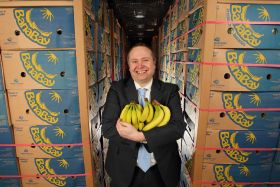
From this month, the company will be able to offer New Zealand apples and Mexican limes for the first time.
Known primarily for Ecuadorian bananas, BanaBay stated to the media that it was responding to customers’ requests for apples, which, while outside the tropical fruit basket, are “a very popular choice”.
The company has chosen to source its apples from New Zealand, already a key market for BanayBay’s bananas, citing the country’s ideal growing climate and reputation for developing exciting new varieties. BanaBay’s varietal range will include Royal Gala, New Zealand Queen, Pacific Rose and Braeburn.
“While our core business remains our Ecuadorian-grown bananas, we have always prided ourselves on our flexible and responsive customer service so when a product is requested, we can act fast to source the best fruit and add it to the suite of products,” said managing director Mark O’Sullivan.
BanaBay is also venturing into the citrus market with the addition of Persian seedless limes. Cultivated on GlobalGAP-certified farmland in Mexico, the fruit, which is in high demand for pan-Asian cuisine and cocktails, will become an integral part of its range, which also includes also includes bananas, pineapples and baby bananas.
High-street chain sets sights on joining discount grocery market with drive to increase fresh produce supply base
Discounter 99p Stores may become the next contender in the flourishing discount sector after stating it is set to expand its supply base for fresh produce.
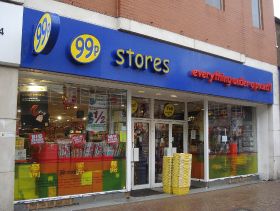
The high-street budget retailer said a recent apple promotion, which sold 10,000 packs in 10 days, shows there is “massive demand” from customers for produce.
“Currently we are working with a small group of suppliers with a view to expanding our supplier base,” said chief operating officer, Tony Brown.
“Our research is showing, more and more suppliers are looking to the discount market for next phase of growth outside the normal supermarket channel. Their research shows that discount channel is the fastest growing sector in retail and appeals to all UK customer types.”
Brown said the chain is currently trialling a range of top-selling fresh produce products, and is looking to extend its range of popular products that are in-season as well as all-year favourites.
He added: “We are working on building our fresh chilled business which is growing rapidly and we are finding that all the top brands are happy to be sold in our chillers.”
‘We want to show support to Brit growers while giving customers a great range to choose from,’ declares retailer’s fruit buyer
The Co-operative Food is planning to sell Red Tractor-approved British apples in more stores than any other retailer this season.
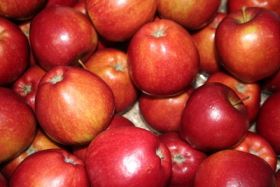
Carla Mills, fruit buyer at The Co-operative Food said: “This year’s bumper crop of great quality fruit will help us to showcase some of the traditional favourites much loved by our customers. Traditional British varieties such as Discovery, Galmac, Early Windsor, Red Windsor, Spartan, Worcester, Wellant, Cameo, Scrumptious, Egremont Russet, Red Pippin, and Red Falstaff will all be sold in our Co-operative Dessert Apple pack, and will change variety as the season progresses.
“With their unique flavour and perfumed scent, many of the older British varieties are now hard to come by, and their short season should be celebrated, and enjoyed whilst available. These varieties will join classic favourites Cox and Gala, Braeburn and of course Bramley.
She added: “We want to show our support to our British apple growers whilst giving customers a great range of British apples and pears to choose from.”
Tesco sold more English apples and pears in 2013-14 than any other retailer, according to an independent industry league table.